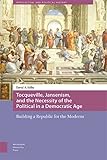Tocqueville, Jansenism, and the necessity of the political in a democratic age building a republic for the moderns / David A. Selby.
Material type: TextSeries: Publication details: Amsterdam : Amsterdam University Press, (c)2015.Description: 1 online resource (285 pages) : illustrationsContent type:
TextSeries: Publication details: Amsterdam : Amsterdam University Press, (c)2015.Description: 1 online resource (285 pages) : illustrationsContent type: - text
- computer
- online resource
- 9048522390
- 9789048522392
- JC229 .T637 2015
- COPYRIGHT NOT covered - Click this link to request copyright permission: https://lib.ciu.edu/copyright-request-form
| Item type | Current library | Collection | Call number | URL | Status | Date due | Barcode | |
|---|---|---|---|---|---|---|---|---|
 Online Book (LOGIN USING YOUR MY CIU LOGIN AND PASSWORD)
Online Book (LOGIN USING YOUR MY CIU LOGIN AND PASSWORD)
|
G. Allen Fleece Library ONLINE | Non-fiction | JC229 (Browse shelf(Opens below)) | Link to resource | Available | ocn918555492 |
Includes bibliographies and index.
Cover; Table of Contents; Acknowledgements; Introduction; Qui êtes-vous Monsieur de Tocqueville?; The Big Payoffs; On Method: What Happens after the Revolution?; A Final Word; 1. Jansenism and Republicanism in Old Regime France; A Précis of the History of Jansenism; An Ideal-Type of Jansenism; The Jansenist Ethic and the Spirit of Resistance: Malesherbes' Resistance to Maupeou's Reforms; Conclusion: Jansenism and Republicanism in Old Regime France; 2. Tocqueville, Jansenism, and French Political Culture, 1789-1859; Two Jansenist Categories: The Notes to Democracy in America.
A Brief History of the Tocqueville Family and the Cultural Influences Present in Family LifeThe Family Library and the Education of an Aristocrat; The Study of Law and Two Friends from Versailles; Jansenist Themes in Tocqueville's Life and Letters; Conclusion: Jansenism in the Life and Works of Alexis de Tocqueville; 3. Providence; Jansenism and Providence: Secular History, Religious Knowledge, and the Imperative to Struggle for the Good in the Space Provided by Providence; The Dual Influence of Bossuet in the Nineteenth Century.
Tocqueville's Apology for Democracy: Contra Maistre on the Nature of the French RevolutionTocqueville's Use of the Theory of Orders: Contra Bossuet; Conclusion: A New Political Science for a Democratic Age; 4. Sovereignty; Pascal's 'Conversation' in the Nineteenth Century; The First Series of Debates: The Villèle Ministry and the Events of 1822; Jansenist and Doctrinaire Responses: Grégoire and Villemain; Louis-Phillipe d'Orléans: Liberal Monarch, or Prince of the French Republic?; The Liberal Monarch and his Ministers: The Doctrinaires.
Tocqueville's Trip to America and the Sovereignty of the PeopleConclusion: The Modern Republicanism of Alexis de Tocqueville; 5. Power and Virtue; The Liberal Challenge: Constant on the Liberties of the Ancients and the Moderns; Tocqueville's First Rejoinder: Individualism and Interest Properly Understood; The Jansenist Toolbox: Pascal, Nicole, d'Aguesseau; From Subject to Citizen: The Moral Relations of the Republic; Conclusion: The Necessity of the Political in a Democratic Age; 6. Religion (I); Setting up the Problem: Stepan and Tocqueville as Third-Way Democrats.
The Freedom of Education and the Failure of Democratic Bargaining, 1843-1844Two Models of Education: Moral and Civic; Tocqueville's Compromise; Conclusion: The Path not Taken, and Reconstructing the Right to the Freedom of Education; 7. Religion (II); Tocqueville's Antinomies and the Democratic Social State; The Political Utility of Religion; The Spill-Over Effect; The Separation Effect; The Restraint Effect; The Mechanism of Practice: A Brief Comparison of Religion in the works of Alexis de Tocqueville and Robert Bellah; The Ideal-Type in History: From America to France.
COPYRIGHT NOT covered - Click this link to request copyright permission:
There are no comments on this title.
